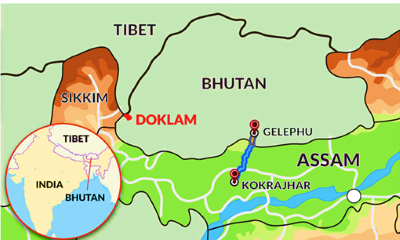Context:
Bhutan's recent announcement of constructing an 'International City' near its southern border with India, particularly in the Gelephu region, has opened avenues for a unique urban development opportunity. King Jigme Khesar Namgyel Wangchuck's declaration during the 116th National Day celebration highlights Bhutan's aim to foster economic transformation and connectivity in the South Asian region. The proposed Gelephu International City, planned as a green city, aligns with Bhutan's commitment to sustainable and eco-friendly practices, making it a compelling model for urban planners. India's involvement, especially through the funding of a railway link between Assam's Kokrajhar and Bhutan's Gelephu, underscores the bilateral cooperation and sets the stage for shared economic growth.
Urbanization towards National Goals:
Bhutan's economic landscape, traditionally reliant on hydroelectricity export and tourism, faced challenges due to the COVID-19 pandemic and increased out-migration of youth, resulting in a spike in unemployment. To address these issues, Bhutan envisions the Gelephu International City as a growth-intensive urban project. King Jigme Wangchuck's emphasis on the city as a 'Smart City' and 'Mindfulness City' reflects Bhutan's multifaceted goals related to connectivity, economic growth, and bilateral/multilateral relations. This vision aligns with Bhutan's unique philosophy of Gross National Happiness (GNH), emphasizing well-being and sustainability in contrast to conventional growth models.
Bilateral Connectivity and Regional Integration:
Bhutan's focus on Gelephu-centric connectivity projects, including the railway link with India, aims to enhance flows and exchanges with India and Southeast Asian nations. This strategic move complements India's Act East Policy, particularly for Northeast India. The border towns, crucial in India's regional policy, receive significant investments for development. The Gelephu International City project serves as a key element in boosting connectivity goals, especially with the recent limitations posed by political turmoil in Myanmar. Bhutan's proactive approach aligns well with India's regional connectivity objectives, fostering cooperation through bilateral mechanisms.
Opportunity for Decentralized Development:
The increased bilateral connectivity offers substantial benefits for Northeast India, particularly Assam, which shares a border with Bhutan. The meeting between King Jigme Wangchuck and Assam's Chief Minister underscores the strategic importance of the region in Bhutan's plans. Gelephu's proximity to Assam's Chirang district, part of the Bodoland Territorial Council (BTC), presents a unique opportunity for decentralized development. The Gelephu International City Project can stimulate economic activities in BTC districts, reducing dependence on state and central funds. Border towns like Bongaingaon, Kajalgaon, and Kokrajhar gain significance, facilitating increased connectivity and trade. The enhanced connectivity also opens avenues for eco-tourism in villages near the Bhutanese border, promoting sustainable initiatives.
Nature-Based Tourism and Conservation:
The Gelephu International City Project holds the potential to leverage the natural beauty of the region for eco-tourism. The Manas National Park, a World Heritage Site, situated nearby, becomes a key asset. The park, along with wildlife sanctuaries in Bhutan, can form a tourism circuit, promoting sustainable tourism across the Indo-Bhutan border. The collaboration can lead to a network of initiatives that showcase the rich biodiversity and contribute to the conservation efforts in both countries. Active engagement by local governing institutions, such as the BTC, aligns with India's decentralization mandate, fostering regional and urban development.
Geopolitical Implications and Regional Development:
India's proactive role in facilitating Bhutanese trade to Bangladesh through West Bengal demonstrates a commitment to regional development. The collaboration has the potential to spur development in Southern Bhutan, Northern Bangladesh, and Northern West Bengal. The shared development goals between Bhutan and India play a crucial role in regional geopolitics, particularly in light of ongoing border disputes with China. This collaborative approach fosters stability and cooperation, providing a model for managing contentious geopolitical situations through shared economic objectives.
Retaining Cultural and Spiritual Heritage in Development:
Bhutan's unique approach to development, rooted in the preservation of its cultural and spiritual heritage, stands out. The nation's commitment to retaining Bhutanese characteristics has led to a decline in poverty and an improvement in Human Development Indicators (HDI). As India experiences rapid urbanization, with an estimated 400 million people expected to live in cities by 2030, Bhutan's development story becomes a valuable case study. The emphasis on cultural and spiritual heritage offers a guardrail against extractive economic practices and fosters inclusive and resilient growth. India's urban planners can draw lessons from Bhutan's approach as they strive to revamp policies for equitable urban development.
Lessons for Sustainable Urban Development:
India's close involvement in Bhutan's International City project provides a significant learning opportunity for urban planners and administrators. Bhutan's commitment to sustainability, coupled with its unique cultural and spiritual heritage, offers insights into developing urbanism models rooted in ethos. As India grapples with the need to revamp policies for building equitable, inclusive, and resilient cities, Bhutan's forthcoming urban expansion becomes a valuable case study. The Gelephu International City project serves as a living example of sustainable urban development, providing practical lessons for Indian urban planners and policymakers.
Conclusion:
In conclusion, Bhutan's ambitious Gelephu International City Project not only signifies a paradigm shift in the nation's economic landscape but also presents a unique opportunity for regional collaboration with India. The project aligns with Bhutan's commitment to sustainability and cultural preservation, making it a valuable model for urban planners in India. The increased connectivity and economic ties offer numerous benefits, especially for Northeast India, providing a catalyst for decentralized development and regional integration. The Gelephu International City, with its focus on nature-based tourism, conservation, and cultural heritage, showcases a holistic approach to urban development. As India navigates its urbanization challenges, the Bhutanese model provides essential lessons for building cities that are not only economically vibrant but also culturally rich and environmentally sustainable. This collaborative effort sets the stage for a mutually beneficial relationship, contributing to the overall well-being and prosperity of both nations.
|
Probable Questions for UPSC Mains Exam
|
Source – Indian Express







